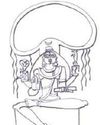
The concept of Nava-Durga is extremely popular during Navratri. Navratri refers to the nine nights that lead to the celebration of Vijayadashmi. The Goddess is worshipped in nine forms. The nine forms are Shailaputri, Brahmacharini, Chandraghanta, Kushmanda, SkandaMata, Kaatyayani, Kalaratri, Mahagauri and Siddharaatri. These are not nine separate goddesses. They represent the nine phases of the goddess' life. The nine nights of Navratri are a celebration of the Goddess in her entirety.
The Goddess is Shakti, who brings meaning to Shiva, who disembodied pure consciousness. The first stage is Shailaputri, where Shakti is the goddess of the mountains. She is born of the mountains and she decides to marry the mountain hermit, Shiva. He, however, does not want to marry. He withdraws into his mountain cave, stubbornly refusing to be with her.
This story is from the October 2023 edition of Yoga and Total Health.
Start your 7-day Magzter GOLD free trial to access thousands of curated premium stories, and 9,000+ magazines and newspapers.
Already a subscriber ? Sign In
This story is from the October 2023 edition of Yoga and Total Health.
Start your 7-day Magzter GOLD free trial to access thousands of curated premium stories, and 9,000+ magazines and newspapers.
Already a subscriber? Sign In

Moringa Flowers
Edible flowers? Yes! Ayurveda mentions many edible flowers. One of them is the Moringa flower.

You Gain Some, You Lose Some
Recently, we the Chennaites, got the opportunity to get blessings from His Sharada Peetam.

A Healthy Body
An incident from Swami Vivekananda's Life

A Man Himself is Responsible for His Deeds
Renouncing doer-ship

The Unstructured Drama of Life
Go for the silent roles

Positive Thinking and Meditation
A life-raft for seniors

Soul Connects
The Yoga Institute’s Reach Out Camp

The Wood Wide Web
As a kid, Suzanne Simard grew up in the rainforests of British Columbia and she normally spent her summers visiting forests around and exploring them along with her family, which included a curious dog named Jiggs.

More About Dharma and Duty
Considering One's Own Background (Part 2)

Devaluing Your Value
The lure of more